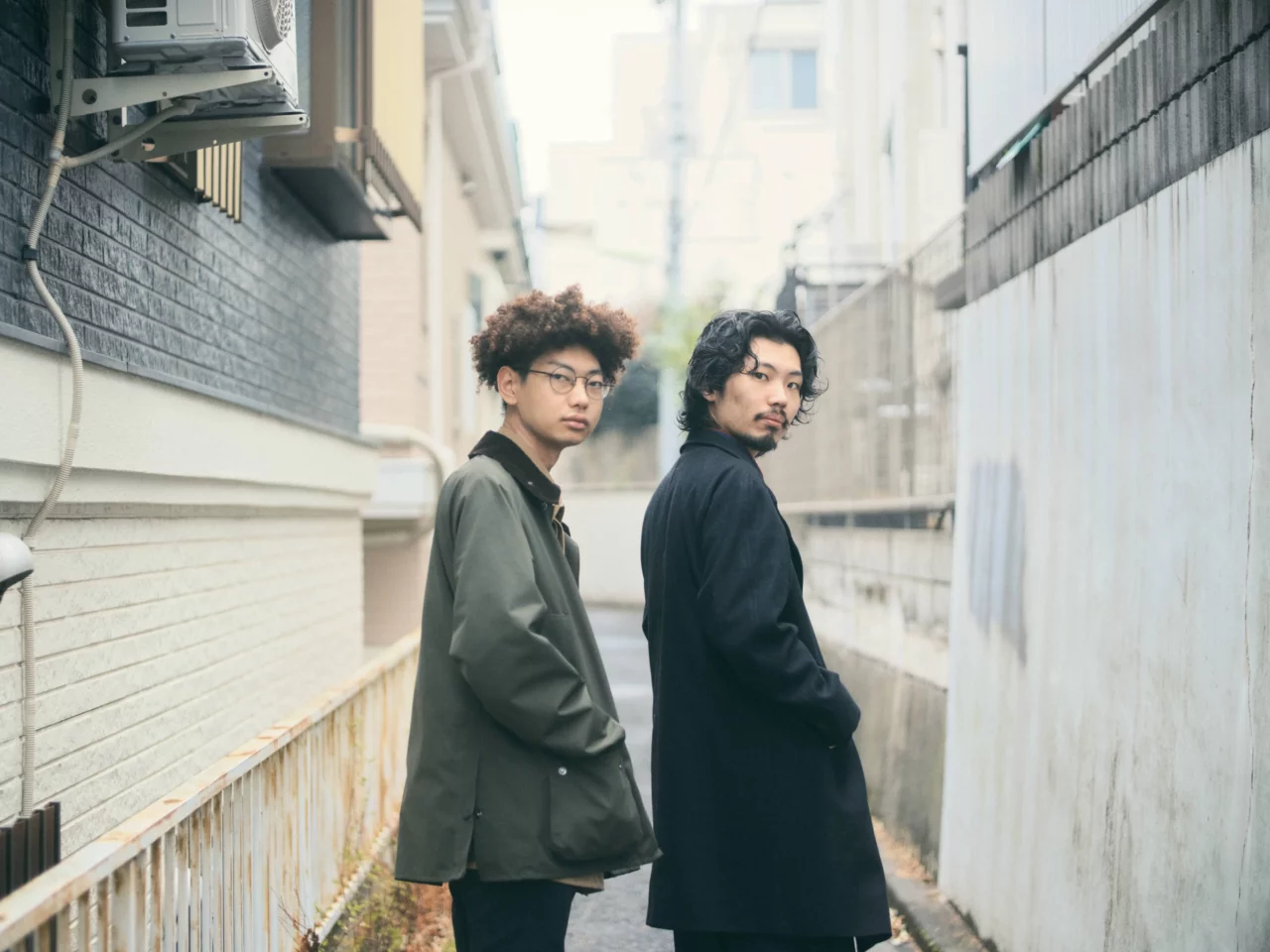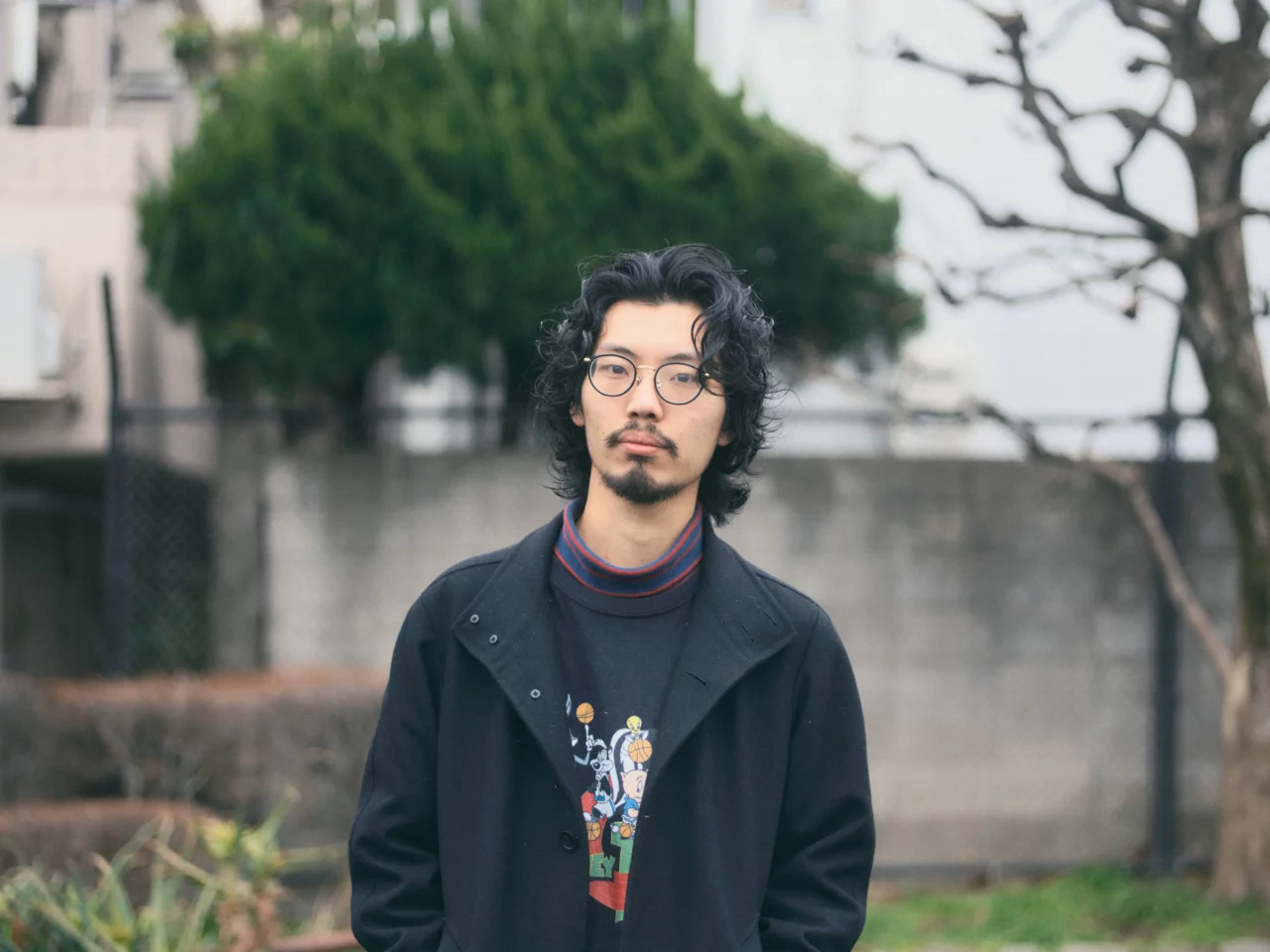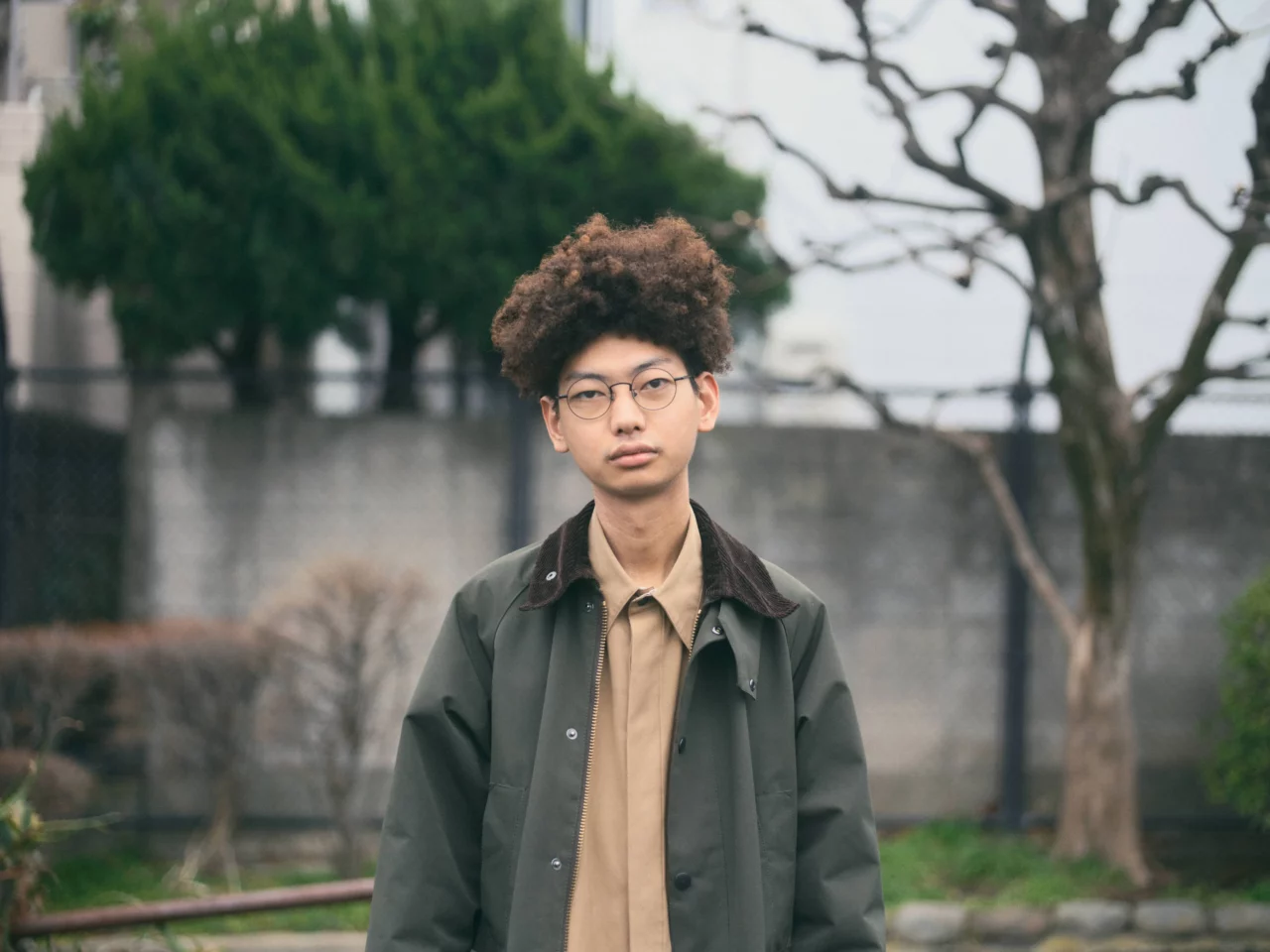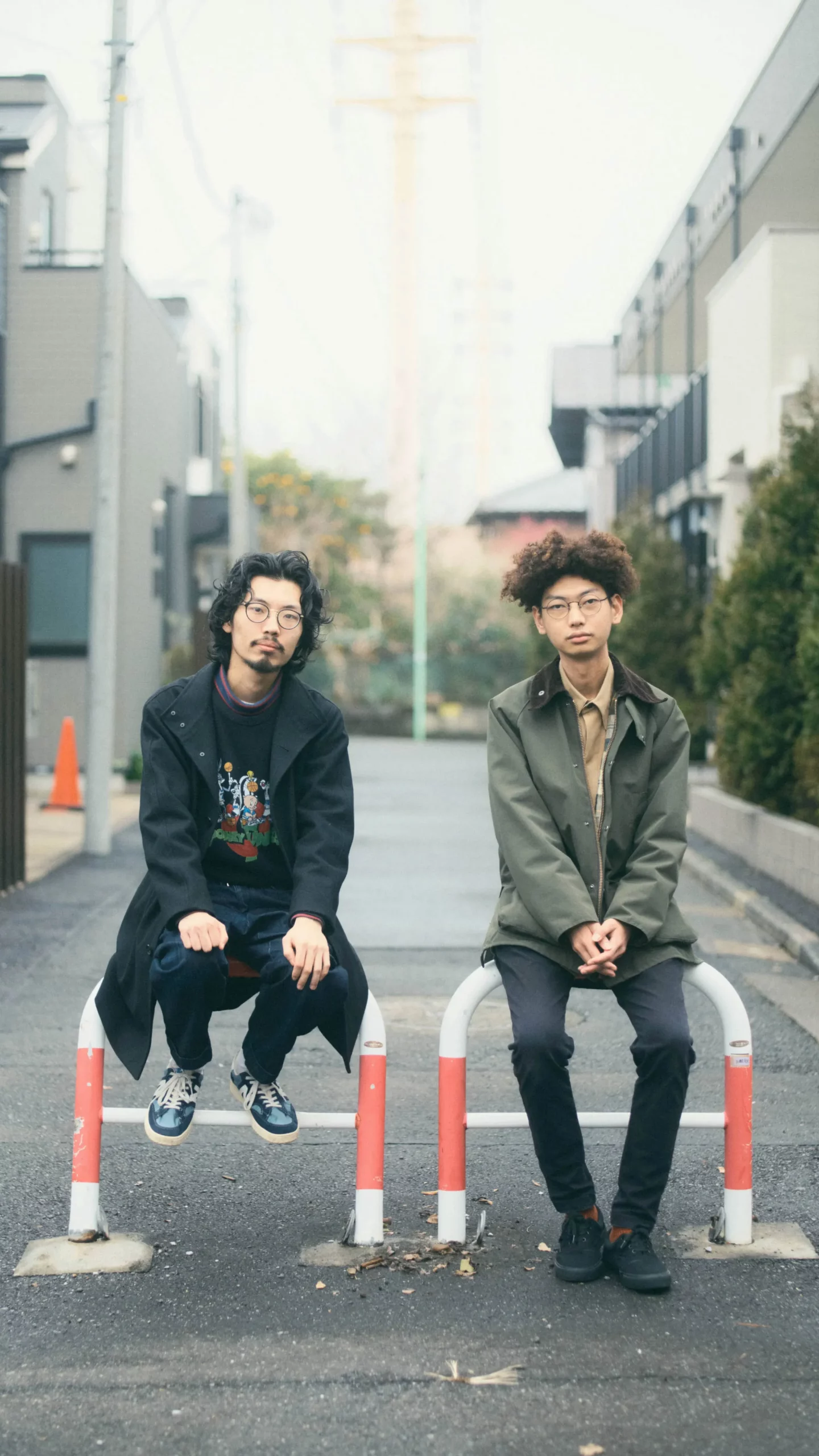Chappo, one of the brightest new acts to emerge from the Kakubarhythm label, has completed their first full-length album, a one & a two. The duo — Oto Fukuhara and Yuta Hosono, both born in 2000 — came together in 2019, but the early years were spent quietly honing their craft through the isolation of the pandemic. It wasn’t until 2023 that they finally stepped into the spotlight with live shows and official releases.
With a one & a two, Chappo channels the lineage of instrumental pioneers like YOUR SONG IS GOOD and SAKEROCK, while pulling in contributions from labelmates such as Ålborg and Omoide Yaro A Team. But rather than simply echoing these influences, Chappo steers the sound somewhere uniquely their own — a curious, textured mix of instrumentals, ambient layers, spoken word, and vocals. It’s in that slightly skewed, unpredictable quality that their music finds its most compelling voice.
The duo’s origin story borders on the folkloric. Drawn to the music of the 1940s, Fukuhara once showed up uninvited to the office of Haruomi Hosono — Yuta’s grandfather — simply to talk about the era’s songs. From that bold encounter, a musical partnership began to form between two people who seem, at once, completely opposite and uncannily in tune.
Their story is already intertwined with a cast of distinctive collaborators — label founder Wataru Kakubari, novelist Asako Yuzuki, who contributed writing to their “Meshi” project, and many more. Following their path is a joy in itself. As they push off into the deeper waters of their musical journey, the question isn’t whether they’ll find their place — but just how strange and wonderful that place might be.
INDEX
It All Began with a Bold Visit to Hosono’s Office
“Oto Fukuhara” is quite a striking name. Are your parents music lovers?
Fukuhara (Gt / etc): Not particularly. But my father was a TV producer, and at the time he was working on a music show. Apparently, he collaborated with Hiro Tsunoda. Tsunoda-san had named his child “Rhythm” (Rizumu), so maybe that had some influence.
When I’m with people like Yuta Hosono or Milo Oyamada (who supports our live shows and is Keigo Oyamada’s son), people often start asking whose kid I am. But in my case, my parents aren’t famous or anything like that.

Formed in 2019, Chappo is an instrumental band consisting of two musicians born in 2000. On December 13, 2023, they released their debut single “Fukidashi” as a 7-inch vinyl through Kakubarhythm. Rooted in 1940s popular music and film scores, their sound blends various elements beyond music, infused with a strange, unique sensibility. A duo on a quirky and unpredictable journey with no clear destination.
Oto, you were drawn to 1940s music and even visited Haruomi Hosono’s office to talk about it, which eventually led to your meeting with Yuta, right? [laughs] What was it that attracted you to 1940s music?
Fukuhara: I’ve always had an interest in history, so as a kid, I loved exploring old things and finding how they connect to the present. Aside from music, I also practiced haiku. I’m from Ehime, where there’s a rich haiku culture, and I studied under the renowned poet Itsuki Natsui. I did haiku for about ten years, starting when I was in elementary school.
As for music, I began playing the guitar when I was about 10. Before that, I played baseball, but I soon realized that the kids who started early or had their dads as coaches were always the best, which made me aware of the social dynamics at play.
Hosono (Ba / etc.): You started at 10? That’s pretty early! [laughs]
Fukuhara: Yeah, so I decided to try something that no one else was doing, and I chose the guitar. Even back then, I was drawn to older music—bands like Cream and The Band. But it was actually due to an illness that I became really drawn to 1940s music.
When I was in middle school, my asthma worsened, and I was frequently hospitalized. During that time, I became obsessed with RKO* films and 1930s musicals. They created these huge sets that you couldn’t imagine today, and they had such a dreamlike atmosphere, which became really comforting for me. That’s when I started to really appreciate the music from that era.
*RKO Radio Pictures: A major American film production and distribution company.

It sounds like it was a bit of an escape from reality.
Fukuhara: Yes, it was like a sanctuary for me.
INDEX
Understanding My Grandfather’s Work and Influence (Hosono)
You ended up getting close with the Hosono family, and I heard that Yuta’s mother suggested you meet Yuta and invited you to a university club’s welcome party. Yuta, at first, thought “this guy is trouble,” but you two became friends. How does Yuta see you now?
Hosono: I thought he was a really interesting guy from the start, but recently, it feels like we have even more in common. Our daily interests seem to overlap more now. In the beginning, he used to come over to my house, and I would talk to him about music, so it was more like the relationship of a teacher and a student. But now, it feels more like a regular friendship.
Yuta didn’t listen to much old music back then, and Oto ended up introducing him to the music of Haruomi Hosono. Is that right?
Hosono: Yes, that’s correct.
Fukuhara: When we first met, it felt pretty strange. It was like, “There’s no connection to that old man,” and I felt there was a certain distance between us, which was much stronger back then than it is now.
Yuta, what kind of music were you listening to before meeting Oto?
Hosono: I liked techno and house music. In high school, I joined the jazz club and started playing bass, which led me to listen to Japanese jazz fusion. But I wasn’t deeply interested in it at first, I didn’t dig into it much.
Also, when I joined the jazz club, there was no one else playing bass, so I thought, “My grandfather did it, so I might as well give it a try.” It was a pretty reluctant start, but over time, I started to enjoy it.
So, while you liked music and instruments, you weren’t digging too deep into it, and then Oto came along and helped you get more immersed in it.
Hosono: Exactly. It felt like a history lesson—learning about what my grandfather did and the impact he had.

























